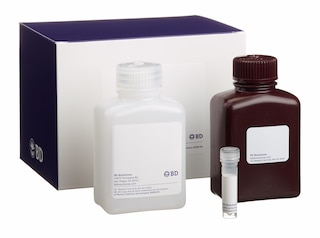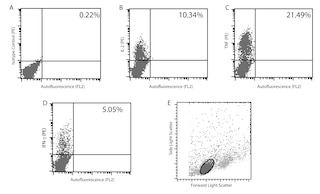Old Browser
This page has been recently translated and is available in French now.
Looks like you're visiting us from {countryName}.
Would you like to stay on the current country site or be switched to your country?


.png)

Expression of IL-2 by stimulated CD4+ and CD4- BALB/c spleen cells. Splenocytes from 6 month old BALB/C mice were stimulated for 15 hr with hamster anti-mouse CD3 (25 µg/ml, clone 145-2C11, Cat. No. 553057) and hamster anti-mouse CD28 (2 µg/ml, clone 37.51, Cat. No. 553294) antibodies in the presence of BD GolgiPlug™ (Cat. No. 555029). The splenocytes were harvested, stained with 0.06 µg of FITC-conjugated rat anti-mouse CD4 (FITC-RM4-5, Cat. No. 553047), fixed, permeabilized, and subsequently stained with 0.25 µg of APC-conjugated rat anti-mouse IL-2 antibody (APC-JES6-5H4, Cat. No. 554429) by using the BD Pharmingen staining protocol (left panel). To demonstrate specificity of staining, the staining by APC-JES6-5H4 was blocked by each of the following: 1) preincubation of the conjugated antibody with recombinant mouse IL-2 (0.25 µg, Cat. No. 550069; middle panel) and by 2) preincubation of the fixed/permeabilized cells with unlabelled JES6-5H4 mouse antibody (5.0 µg; Cat. No. 554425) prior to staining with the APC-JES6-5H4 (right panel). The quadrant markers for the bivariate dot plots were set based on the autofluorescence controls and verified using the recombinant cytokine blocking and unlabelled antibody blocking specificity controls. This APC-conjugated reagent can be used in any flow cytometer equipped with a a dye, HeNE or red diode laser. These include the dual laser FACStarPLUS™, FACS Vantage™ or FACSCalibur™.
.png)

BD Pharmingen™ APC Rat Anti-Mouse IL-2
.png)
Regulatory Status Legend
Any use of products other than the permitted use without the express written authorization of Becton, Dickinson and Company is strictly prohibited.
Preparation And Storage
Recommended Assay Procedures
Immunofluorescent Staining for Flow Cytometric Analysis: The APC JES6-5H4 antibody is useful for immunofluorescent staining and flow cytometric analysis to identify and enumerate IL-2 producing cells within mixed cell populations. For optimal immunofluorescent staining for flow cytometric analysis, the anti-cytokine antibody should be titrated. For specific methodology, visit the protocols section of our website, www.bdbiosciences.com. A useful control for demonstrating specificity of staining is either of the following: 1) pre-block the APC-conjugated JES6-5H4 antibody with ligand (e.g., recombinant mouse IL-2, Cat No. 550069) prior to staining, or 2) pre-block the fixed/permeabilized cells with unlabeled JES6-5H4 antibody (Cat. No. 554425) prior to staining. The staining technique and blocking controls are described in detail by C. Prussin and D. Metcalfe.
A suitable rat IgG2b isotype control for assessing the level of background staining on paraformaldehyde-fixed/saponin-permeabilized mouse cells is APC A95-1(Cat. No. 556924); use at comparable concentrations to antibody of interest.
Product Notices
- Since applications vary, each investigator should titrate the reagent to obtain optimal results.
- Please refer to www.bdbiosciences.com/us/s/resources for technical protocols.
- For fluorochrome spectra and suitable instrument settings, please refer to our Multicolor Flow Cytometry web page at www.bdbiosciences.com/colors.
- Caution: Sodium azide yields highly toxic hydrazoic acid under acidic conditions. Dilute azide compounds in running water before discarding to avoid accumulation of potentially explosive deposits in plumbing.
- Use of these products to measure activation antigens expressed on mononuclear cell subsets for the purpose of monitoring immunoregulatory status can fall under one or more claims of the following patents: US Patent Nos. 5,445,939, 5,656,446, 5,843,689; European Patent No. 319,543; Canadian Patent No. 1,296,622; Australian Patent No. 615,880; and Japanese Patent No. 2,769,156.
Companion Products

.png?imwidth=320)

The JES6-5H4 monoclonal antibody specifically binds to mouse interleukin-2 (IL-2), a multifunctional cytokine that plays pivotal roles in immunity and tolerance. It is produced by activated T cells and affects the activation, growth, proliferation and/or differentiation of various cell types including T and B lymphocytes and their precursors, LAK cells, NK cells, and monocytes/macrophages. IL-2 mediates its biological activities by binding to IL-2 receptor complexes. The intermediate affinity IL-2R is comprised of IL-2Rβ (CD122) and common gamma chain (γc; CD132) subunits, whereas the high-affinity IL-2R is comprised of IL-2Rα (CD25), IL-2Rβ, and γc subunits. The JES6-5H4 monoclonal antibody binds to IL-2 and neutralizes its biological activity.

Development References (4)
-
Abrams J. Immunoenzymetric assay of mouse and human cytokines using NIP-labeled anti-cytokine antibodies. Curr Protoc Immunol. 2001; 1:6.20-6.21. (Clone-specific: ELISA). View Reference
-
Abrams JS, Roncarolo MG, Yssel H, Andersson U, Gleich GJ, Silver JE. Strategies of anti-cytokine monoclonal antibody development: immunoassay of IL-10 and IL-5 in clinical samples. Immunol Rev. 1992; 127:5-24. (Clone-specific: ELISA, Immunoprecipitation). View Reference
-
Prussin C, Metcalfe DD. Detection of intracytoplasmic cytokine using flow cytometry and directly conjugated anti-cytokine antibodies. J Immunol Methods. 1995; 188(1):117-128. (Methodology: Flow cytometry). View Reference
-
Sander B, Hoiden I, Andersson U, Moller E, Abrams JS. Similar frequencies and kinetics of cytokine producing cells in murine peripheral blood and spleen. Cytokine detection by immunoassay and intracellular immunostaining. J Immunol Methods. 1993; 166(2):201-214. (Clone-specific: ELISA). View Reference
Please refer to Support Documents for Quality Certificates
Global - Refer to manufacturer's instructions for use and related User Manuals and Technical data sheets before using this products as described
Comparisons, where applicable, are made against older BD Technology, manual methods or are general performance claims. Comparisons are not made against non-BD technologies, unless otherwise noted.
For Research Use Only. Not for use in diagnostic or therapeutic procedures.
Report a Site Issue
This form is intended to help us improve our website experience. For other support, please visit our Contact Us page.